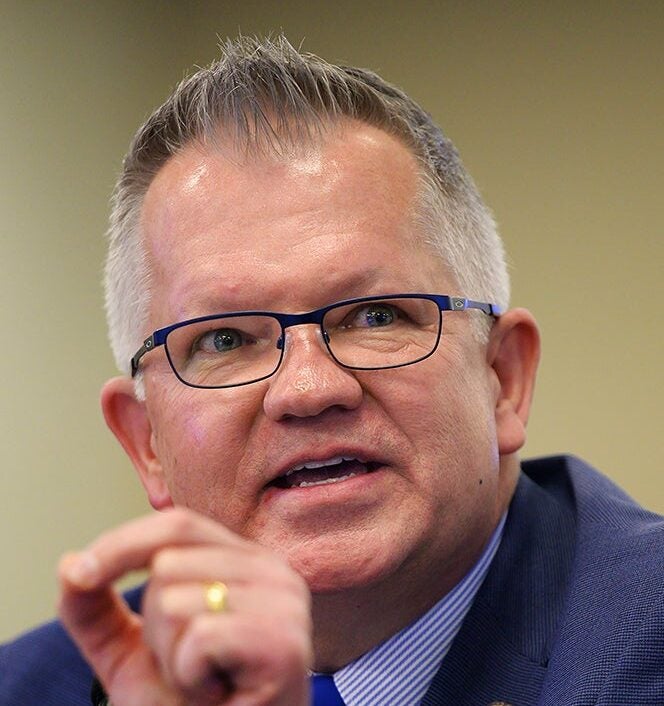Carroll bill would bolster DJJ youth mental health treatment
Published 1:23 pm Tuesday, March 12, 2024

- FRANKFORT, Feb. 20 – Sen. Danny Carroll, R-Benton , presents Senate Bill 203, an act related to early childhood education, during the Tuesday meeting of the Senate Committee on Families and Children. (LRC Public Information)
After major crises at Department of Juvenile Justice detention centers, Sen. Danny Carroll, R-Benton, passed legislation last year investing $55 million into comprehensive reforms.
Now, he’s sponsoring another bill bolstering mental health treatment of DJJ youth.
Senate Bill 242 would establish a process for placing “high-acuity youth,” those who need a specialized environment and treatment plan to address aggression and violence, in inpatient psychiatric hospitals or pediatric teaching hospitals instead of DJJ facilities.
What would the bill do?
Carroll said that the bill was a collaboration between the Justice and Public Safety Cabinet, the Cabinet for Health and Family Services, the Kentucky Hospital Association and the Administrative Office of the Courts.
“We’re supposed to take care of kids,” said CHFS Secretary Eric Friedlander. “It shouldn’t be that complex, but it ends up being really complex, between the courts, between the DJJ, between the cabinet, between the hospital association, providers—so many different perspectives on how to do this well and how to do this right.”
Under the bill, children in the DJJ or the Cabinet for Health and Family Services’ custody who need psychiatric treatment would receive a behavioral assessment from a qualified clinical professional.
If they are determined to be a high-acuity youth, the clinical professional would prepare a written statement for the DJJ, the courts and the Department for Behavioral Health, Developmental and Intellectual Disabilities, including supporting evidence for the youth’s classification and a recommendation for where they should receive treatment.
If everyone agrees, the initial treatment plan would be submitted to the court for approval. If not, the party that disagrees could file a dissenting statement with the court, where a judge would decide the appropriate course of action or schedule a hearing.
Inpatient psychiatric hospitals and pediatric teaching hospitals that take high-acuity youth would be reimbursed at double the regular inpatient rate. Due to security concerns, they would have to develop a protocol for 24-hour access.
If a high-acuity youth acts violent toward any staff, patients or visitors during their stay, they would be charged criminally, discharged from the hospital and returned to their last place of custody.
When it’s determined that a high-acuity youth should receive psychiatric treatment within DJJ facilities, the DJJ can contract with hospitals to provide outpatient services.
Senate Bill 242 also tackles a few other DJJ issues. It would require the DJJ to build at least two female-only youth detention centers in central and western Kentucky, segregated by violent and non-violent offenders, by February 2026.
If a third or fourth center were needed, they would be built in eastern or northern Kentucky.
It also instructs the Justice and Public Safety Cabinet to build a high-acuity mental health facility to provide residential treatment for youth in detention by the same time. The facility would have a minimum of 16 beds, with the ability to expand.
These facilities come with a price tag, but Carroll’s bill does not include an appropriation. Instead, he’s asking for the $165 million in this year’s budget.
Justice and Public Safety Secretary Keith Jackson said that the bill is an “innovative, progressive move towards the safety of our youth as we go forward.”
Sen. Whitney Westerfield, R-Fruit Hill, told Carroll that he is often concerned that the General Assembly only ever responds to crises with penalties.
“That’s important and we should, but to not respond to the behavioral crises these kids and their families are clearly facing in every single circumstance in one variety or another is legislative malpractice,” he said. “We can’t ignore that, and your bill does not ignore that.”
How did we get here?
After a riot at the Adair Regional Juvenile Detention Center, including the sexual assault of a teenage girl, made headlines, the General Assembly decided to order an audit into the DJJ alongside several reforms.
Those reforms included segregating male and female youth, violent and nonviolent offenders, reorganizing the DJJ’s structure to improve and centralize communication and beginning to move the DJJ back to a regional model.
In January, Auditor Allison Ball released the audit results, which found a myriad of issues within DJJ facilities.
Overuse of isolation, inappropriate use of force, understaffing, insufficient mental health staffing and treatment access and use of a punishment-based behavior management system were identified as key problems.
Two months ago, several women filed a lawsuit against the Adair County Youth Detention Center, the DJJ, the Cabinet for Health and Family Services and others over the facility’s treatment of hundreds of youth.
One particular case involves a girl who was confined to an isolation cell for months after a suicide attempt. According to the lawsuit, she was kept there without clothing, a toilet, a bed or access to a shower for nearly two weeks. Staff allegedly punished her by refusing to give her prescribed medications to treat her mental health conditions.
Carroll referred to this instance as a situation he hopes this bill will prevent.
“We’re not going to have these kids, once we get this facility built, locked up in a cell, naked, sleeping in feces, no treatment, minimal treatment,” he said. “That’s just not going to happen anymore with this.”





